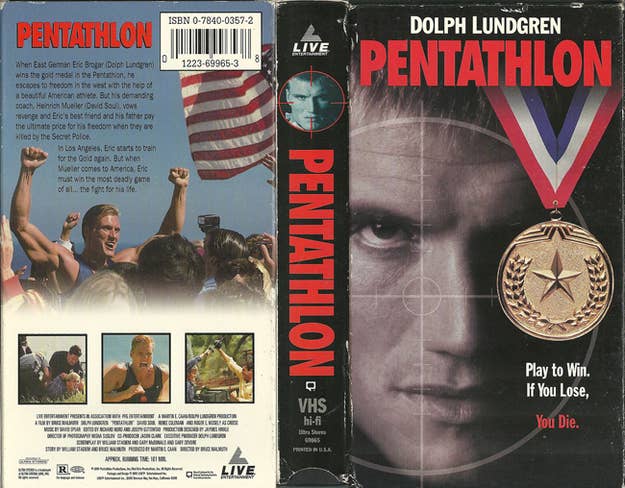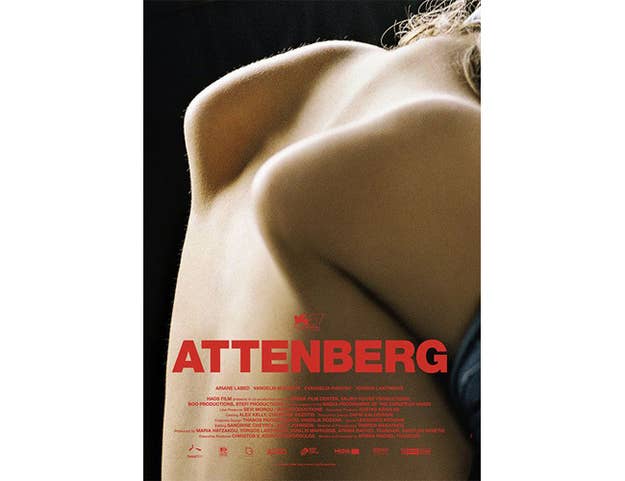
If you're in the mood for the kind of enjoyably doofy red-meat cinema that The Expendables films are consciously trying to evoke: Pentathlon (1994, Bruce Malmuth)
One of the hardest things I have to do as a cinephile is justify the incredible amount of junk I watch. I can come up with all manner of defenses involving culture and genre and audience desire — I’ve been doing it for years. But truthfully, it just boils down to the fact that movies like Bruce Malmuth’s Pentathlon make me happy. As much as I try to be all-encompassing in my tastes and I appreciate the highbrow and the challenging and the beautiful, there’s a huge part of me that just loves dumb shit. Which is to say, if you make a movie with Dolph Lundgren as a former East German Olympian who defects to America and finds himself set upon by his old coach, and then you go so far as to include a character shouting in all seriousness, “You’re a Nazi gone mad! You must be stopped!” as though it’s the gone-mad part that’s the problem… well, I’m all yours, Bunky.
Seriously, there’s a scene in here where a neo-Nazi dances to German hip-hop playing on his ghetto blaster while Lundgren’s trainer, a salt-of-the-earth black guy who owns a hamburger joint, grouses about the noise, and it’s played like that’s the sort of thing you see in movies all the time. It’s that professionalism in the face of low budgets and lower expectations that makes the difference, from where I stand. Pentathlon might be idiotic, but I’ll be damned if I didn’t like the cut of its B-movie jib anyway.

If you're in the mood for a very offbeat character study that includes scenes of people acting like animals and Silly Walking: Attenberg (2010, Athina Rachel Tsangari
They say you should start as you mean to go on. Taking this truism and running into the end zone with it, Athina Rachel Tsangari opens her strange and captivating Attenberg with the most awkward and least erotic lesbian tongue kissing you’re ever likely to see. With this one scene, Tsangari sets the dominant design – uncomfortable human interaction infused with the terror of fluid exchange, filmed in a consciously hermetic style favoring abrupt cuts and determined, deadpan framing. It’s an appropriate way to depict a emotionally stunted, withdrawn world, made all the more effective when the two kissing girls — protagonist Marina (Ariane Labed) and best friend/sexually open Bella (Evangelina Randou) – drop to their haunches and start to imitate warring animals. As Attenberg moves cautiously along its way, detailing Marina’s efforts to care for her dying father (Vangelis Mourikis) and maybe get to know an engineer (Dogtooth director Giorgos Lanthimos) with whom she works a little better, the animal game pops up a few times as a refuge from awkwardness.
Coupled with the recurring use of David Attenborough’s nature documentaries (the title comes from a malapropism of David’s name) and a father-daughter linguistic game involving rapid-fire rhyming, it becomes clear that Tsangari is using nonsense and imagination as a contrast to the ill-fitting, overly logic-bound human body — a popping of the bubble, if you will. That, ultimately, is the slowly dawning narrative crux of Attenberg; Marina starts the film as asexual and ill at ease with others, telling her father, “I have never desired.” Yet she’s inquisitive like a child on the cusp of puberty, and as the notion that her father is going to die looms larger, she begins to feel the need to find other sources of comfort, resulting in some painful, halting attempts at interaction. Tsangari’s visuals reflect this — many of the compositions are static, arranged, weirdly arid, oft-symmetrical. Even the shots that are off-kilter are so in a very precise, thought-out sort of way. But then there’s the scene roughly halfway through where Marina tries to get intimate for the first time, and suddenly the film, for the first time, becomes something far more wild — ragged and jarringly unbalanced, with shots framed far too tight and handheld jitteriness taking the place of meticulousness. That sense of sudden unavoidable pain lingers through the rest of the film like a memory of nausea, providing Attenberg with its true dramatic kick. Smashing through one’s self-imposed barriers ain’t easy. But sometimes, it’s necessary.

If you're in the mood for a stellar example of animation for adults: Idiots and Angels (2008, Bill Plympton)
Get outta those shoes and grow wings, kid… From the start, animator Bill Plympton’s Idiots and Angels sets itself apart from his previous works. Where films like I Married a Strange Person! and Mutant Aliens are bizarre, energetic affairs full of lively hand-penciled colors and spirited rude humor, Idiots and Angels is a film of smoke and shadow, its tentative sparks of life hazy and distant and lost in a fog of drink and dashed dreams. The film is about a viciously misanthropic man (referred to in the credits simply as Angel), whittling his life away on a bar stool drowning in anger and drunken fantasy. One day awakens to find angel’s wings growing on his back. He resists their influence, even slicing them off, but as they grow back he finds they have a mind of their own… and other openly covetous people have noticed his new appendages. Plympton’s main tone here is one of bitter, black comedy, with the central joke being that a complete rotter is forced, initially very against his will, to shape up and rediscover the good within – likely the nastiest cosmic joke that could be played on a man as entrenched in his pissed-off wallowing as Angel.
Idiots and Angels is the kind of film that uses Tom Waits songs at a couple different points in the film and feels like it’s earned the right to do so — bottom-of-the-bottle cinema at its most bracing, ugly and (lest I forget) soul-coughingly funny and clever.
The Netflix streaming library is vast and daunting and mostly filled with crap. Steve Carlson is the Netflix video clerk, and every week he hand-delivers three awesome movies you've never heard of before. He's been writing about movies in one form or another on the Internet since 2002 and co-hosts the Bad Idea Podcast. Someone once called him the lonely Magellan of exploitation cinema. He thinks that's the best compliment he's ever received.
